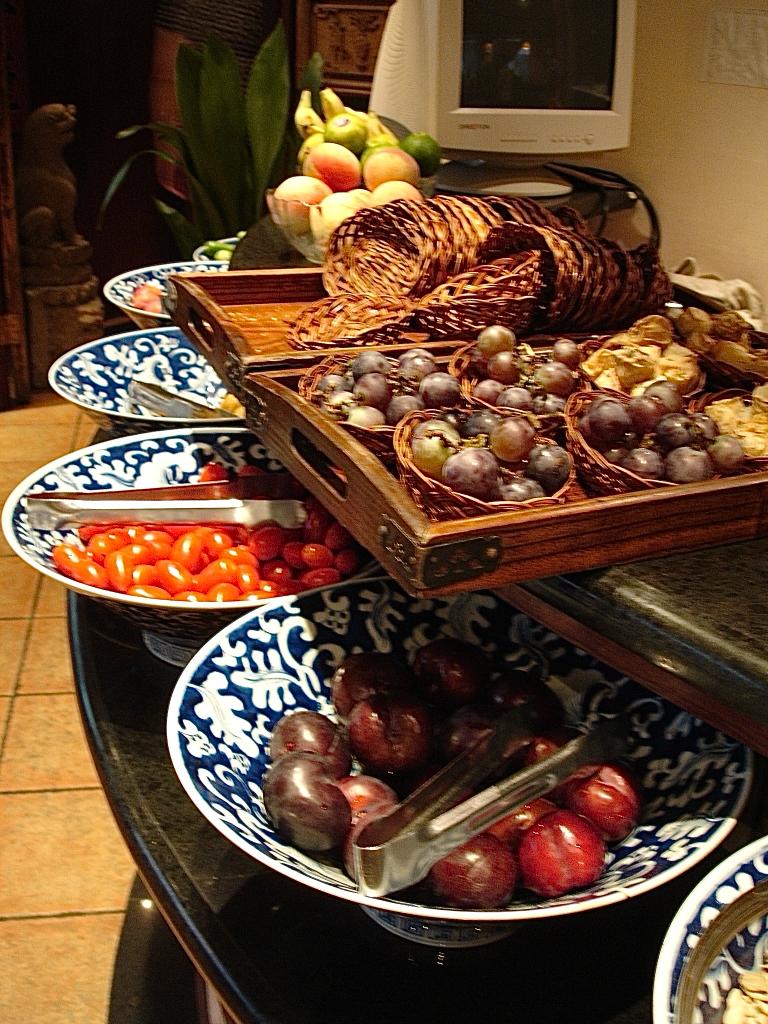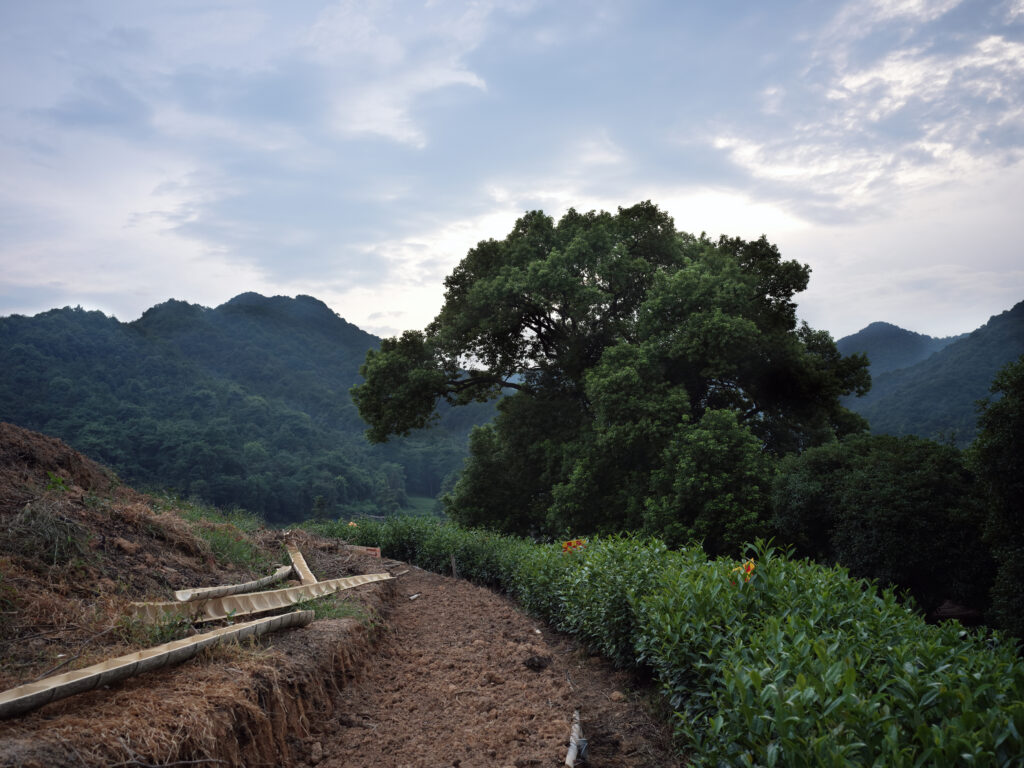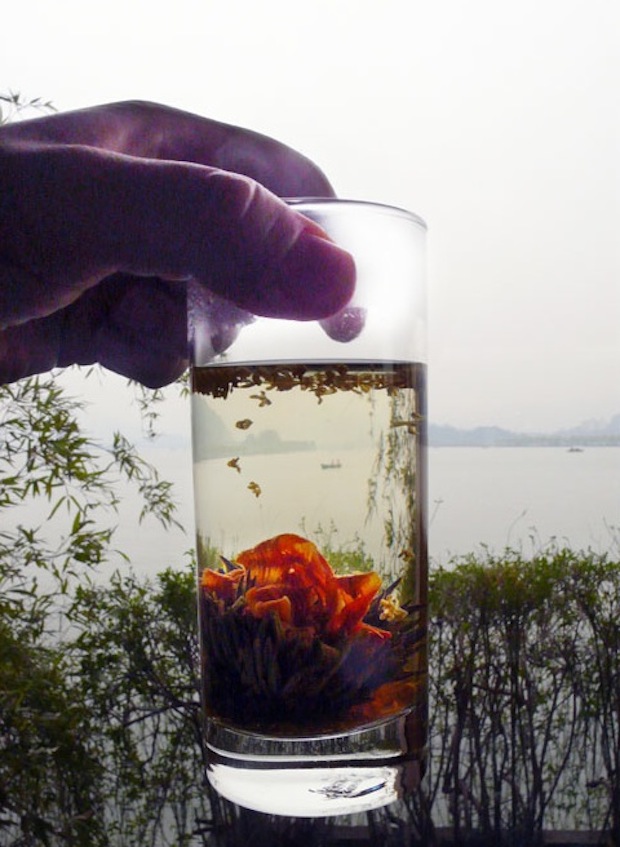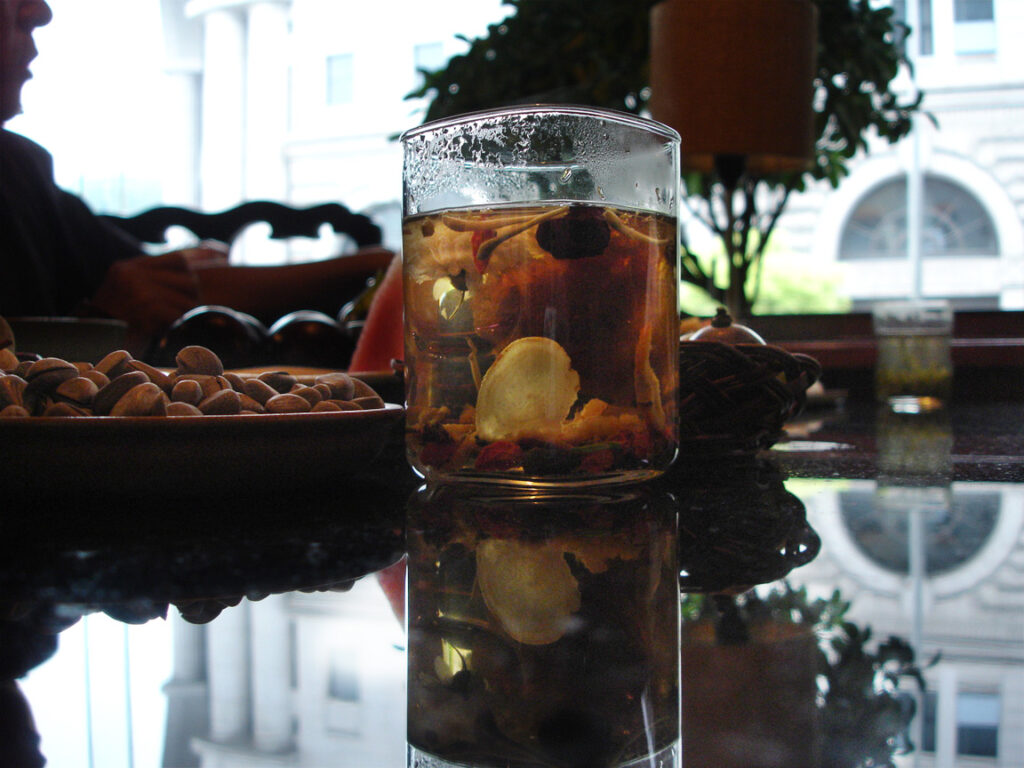The Tower of Reading
舐眼
Zhang Dai (張岱, 1597-ca. 1684) was an historian and essayist active in the late-Ming and early Qing dynasties. Below we offer two translations by Duncan Campbell. The first, ‘A Certain Obsession’, is a new work, while ‘Old Man Min’s Tea’ is reprinted from an issue of China Heritage Quarterly devoted to the subject of tea. Both are taken from Zhang Dai’s Dream Memories of Tao’an 陶庵夢憶.
As Duncan has remarked, Dream Memories ‘earned Zhang Dai a lasting reputation as one of the finest prose writers of the tradition’. Although, ‘by the time Zhang Dai sought to immortalise his memories his world of people and objects, of smells, tastes and sounds had suffered what is often considered to have been the most cataclysmic dynastic transition in all Chinese history, and Zhang Dai himself had been reduced from the lap of luxury to self-imposed exile and arrant poverty.’
In his elegiac writing, Zhang Dai recorded the lost luxuries of the past and in the introduction to Searching in Dreams for West Lake 西湖夢尋, his celebrated memoir about Hangzhou, a city laid waste by the Manchu-Qing invaders, he said that he felt like
a mountain dweller who, having visited the seaside for the first time in his life, returns home and tries to describe its wonders to his incredulous neighbors. As they crowd around he speaks about the sea delicacies he ate and the sights he saw, and so vivid are his words and marvelous those visions that they all make to lick his eyes [舐眼]. ‘But’, Zhang Dai asks, ‘how could they ever hope to satisfy their craving thereby?’
余猶山中人歸自海上,盛稱海錯之美,鄉人競來共舐其眼。嗟嗟。金齏瑤柱,過舌即空,則舐眼亦何救其饞哉。
— 《西湖夢尋》自序, quoted in An Artistic Exile, p.272
***
Our thanks to Duncan for allowing us to publish his work in our series The Tower of Reading and to Lois Conner for permission to reproduce some of the work she has made in Hangzhou.
— Geremie R. Barmé
Editor, China Heritage
1 January 2024
***
Reference Material:
- Duncan Campbell Archive, China Heritage
- Lois Conner, West Lake, a photographic essay, China Heritage Quarterly, No. 28, December 2011
Further Reading on Zhang Dai:
- Orchid Pavilion: An Anthology of Literary Representations, China Heritage Quarterly, No. 17, March 2009
- Zhang Dai 張岱, The Ten Scenes of West Lake 《西湖十景》, translated by Duncan Campbell with photographs by Lois Conner, China Heritage Quarterly, No. 28, December 2011
- Duncan Campbell, Searching for the Ming, China Heritage Quarterly, No. 28, December 2011
- Duncan Campbell, 1638: Zhang Dai in Nanking, China Heritage Annual: 2017
A Note on Zhang Dai
Duncan Campbell
Zhang Dai was born in Shanyin 山陰 in Zhejiang Province (present-day Shaoxing 紹興) to a family of immense wealth, prestige and scholarly achievement.[1] He grew up in the very lap of late-Ming luxury and extravagance, surrounded by antiques, a book collection of over 30,000 volumes, family operatic troupes and singing girls. During the first half of his life he idled away the days in the various family gardens in both Shanyin and along the banks of West Lake.[2] Later he would claim that he had ‘misspent’ the first four decades of his life in pursuit of one or another of his many obsessions — 頗事豪華.
All came to a calamitous end with the fall of the Ming dynasty in 1644 following the Manchu-led Qing invasion from beyond the Great Wall that first saw the conquest of the imperial capital of Beijing and then the empire proper. In his account of the period, those years of violent transition could not have been more dramatic, nor the contrast between what had been and what would follow more stark. The last four decades of his life, years during which Zhang Dai did the bulk of the writing that was to earn him a delayed immortality, were eked out in arrant poverty, ‘his state fallen, his family destroyed’,[3] shunned by friends, his son kidnapped, and the books he had once so loved used to stoke the fires of the marauding troops who had brought such destruction to his world.[4]
On a number of occasions Zhang declared that: ‘One cannot befriend a man who is without an obsession’. ‘For’, he went on to explain, ‘he lacks deep emotion; one cannot befriend a man who is without any fault for he is without authenticity’.[5]
Notes:
[1] Both Zhang Dai’s great-grandfather, Zhang Yuanbian 張元忭 (1538-1588) and his grandfather, Zhang Rulin 張汝霖 (d.1625), had been Advanced Scholars, the former having studied under Wang Yangming’s 王陽明 (1472-1529) disciple Wang Qi 王畿 (1498-1583), and both having held high rank within the imperial bureaucracy.
[2] For translations of Zhang Dai’s accounts of some of these gardens, see Duncan Campbell, trans., ‘The Gardens of His Youth: Extracts from Zhang Dai’s Dream Memories of Tao’an’, in Rachel May and John Minford, eds., A Birthday Book for Brother Stone: For David Hawkes, at Eighty, Hong Kong: The Chinese University Press and Hong Kong Translation Society, 2003, pp.229-46.
[3] ‘Preface’ 序, Dream Memories of Tao’an 陶菴夢憶, Mi Songyi 彌松頤, ed., Hangzhou: Xihu Shushe, 1982, p.117. For a translation and study of this preface, see Stephen Owen, Remembrances: The Experience of the Past in Classical Chinese Literature, Cambridge, Mass.: Harvard University Press, 1986, pp.131-41.
[4] Zhang Dai tells of the fate of this book collection in ‘Three Generations of Book Collecting’ 三世藏書 in Dream Memories of Tao’an, pp.24-25, a translation of which may be found in Renditions (1990), 33 & 34: 165-66, ‘Zhang Dai: Six Essays’.
[5] The comment is first made, it would appear, in an item on Qi Biaojia’s 祁彪佳 cousin Qi Zhijia 祁豸佳 entitled ‘Qi Zhixiang’s Obsessions’ 祁止祥癖 in Dream Memories of Tao’an, p.53. It is repeated verbatim in Zhang’s ‘Biographies of Five Eccentrics’ 五異人傳, Langhuan wenji 琅嬛文集, Changsha: Yuelu Shushe, 1985, p.175.
— from Searching for the Ming, China Heritage Quarterly, December 2011
***

***
Local Products — a Certain Obsession
Zhang Dai
translated by Duncan Campbell
In all of Shaoxing, there is no greater glutton for delicacies than me, and I have an especial fondness for local products. From Beijing, it is China chestnuts, Peking cabbage, and horse teeth cabbage; from Shandong, ox stomach morels, autumn white pears, yellow-horn nuts, and the Chinese pear; from Fujian, it is Fujianese oranges, Fujianese orange cake, ox hide sugar, and red bean curd; from Jiangxi, the green root, and the dried fruit of Fengcheng; from Shanxi, celestial flower vegetable; from Suzhou, boned abalone, hawthorn, both diced and in cakes, sugared pine nuts, yams, and dried olives; from Jiaxing, dried seerfish, and goldfinches from Tao Estate; from Nanjing, trays of cherries, cherry dates, water chestnut paste, Chinese lettuce paste, and sugared hawthorn; from Hangzhou, watermelons, prickly water lily, lotus root, Chinese leek shoot, black bamboo shoots, sweet oranges from Tangxi; from Mount Xiao, red bayberries, water-shield, pigeon, black carp, and flat persimmons; from Zhuji, masked palm civet, cherries, tiger chestnuts; from Sheng County, powdered pignut, fine nutmeg-yew, and Longyou sugar; from Linhai, square melons; from Taizhou, ribbed cockle, and dried river scallop; from Pujiang, roasted pork; from Dongyang, southern dates; from Shanyin, bamboo shoots from Broken Pond, Xie Family mandarins, Solitary Mountain water caltrop, river crabs, Three River Village razor shells, white clam, river fish, shad, and inner river mackerel.
From distant parts, I had such delicacies delivered to me annually; from parts more proximate, each month would bring new supplies, and in some cases, they arrived on a daily basis. So obsessed did I become with my craving for such delights that each day would see me plotting on behalf of my mouth and my stomach, my wicked crimes in this respect being many and certain. And yet, thinking back upon all this from the perspective of the present, at a time when warfare ravages all four quarters and inch by inch our land has been taken from us, and when one no longer dares venture much beyond the girdle-like Qiantang River, one cannot but reflect that an age during which such delicacies came to one from all four quarters was indeed a blessed and a virtuous one.
***

***
方物
張岱
越中清饞,無過余者,喜啖方物。北京則蘋婆果、黃巤、馬牙松;山東則羊肚菜、秋白梨、文官果、甜子;福建則福桔、福桔餅、牛皮糖、紅腐乳;江西則青根、豐城脯;山西則天花菜;蘇州則帶骨鮑螺、山查丁、山查糕、松子糖、白圓、橄欖脯;嘉興則馬交魚脯、陶莊黃雀;南京則套櫻桃、桃門棗、地栗團、窩筍團、山查糖;杭州則西瓜、雞豆子、花下藕、韭芽、玄筍、塘棲蜜桔;蕭山則楊梅、蒓菜、鳩鳥、青鯽、方柿;諸暨則香狸、櫻桃、虎栗;嵊則蕨粉、細榧、龍游糖;臨海則枕頭瓜;台州則瓦楞蚶、江瑤柱;浦江則火肉; 東陽則南棗;山陰則破塘筍、謝桔、獨山菱、河蟹、三江屯堅、白蛤、江魚、鰣魚、里河鰦。遠則歲致之,近則月致之、日致之。耽耽逐逐,日為口腹謀,罪孽固重。但由今思之,四方兵燹,寸寸割裂,錢塘衣帶水,猶不敢輕渡,則向之傳食四方,不可不謂之福德。
***
Source:
- 張岱著,《陶庵夢憶·方物》, IV: 13.

***
Old Man Min’s Tea
Zhang Dai
translated by Duncan Campbell
Introduction
Zhang Dai disliked drinking wine; his connoisseurship of tea (its varieties, the utensils used in its brewing and drinking, above all, the varying qualities of the water used), however, was second to none in his own time, except perhaps to the man he immortalises in the item from his Dream Memories of Tao’an 陶庵夢憶 translated below.
Zhang’s friend Zhou Monong 周墨農 had tried to introduce the two men on a previous occasion, without success. Once they established their friendship, in the manner told of below, the two ‘got on as if we had known each other all our lives,’ Zhang Dai tells us elsewhere, in the ‘Preface’ to his History of Tea 茶史, ‘and not a day would go by without us sharing a cup of tea together’. Sadly, apart from this Preface, Zhang Dai’s history, discussed in detail with Min Wenshui 閔汶水, is no longer extant.
— Duncan Campbell
***
Zhou Monong had told me that he thought I would never manage to drink a cup of Min Wenshui’s tea. During the Ninth Month of the wuyin year [1638], when I travelled to the secondary capital Nanjing, as soon as I got ashore, therefore, I set off towards Peach Leaf’s Ford to call upon him. It was already quite late in the afternoon by the time I arrived and I found that Wenshui had gone off elsewhere. When he eventually returned, he turned out to be a rather frail old man. Just as we had begun to exchange pleasantries, however, he suddenly leapt to his feet and exclaimed:
I’ve left my walking stick somewhere or other!
With which, he took off again. ‘I’ve not come all this way for nothing’, I told myself, resolving to sit down to await his return, however long it took. It was the first watch of the evening before he finally turned up again. Peering at me, he said:
So, you’re still here! What is it you want?
‘I’ve long admired you, and I’m not going to leave here without having a good drink of your tea’, I replied. This seemed to please him greatly and he got to his feet again and went over to the brazier to boil some water. In a flash, tea was brewed.
He led me into another room with clear windows and clean side tables upon one of which sat a teapot from Bramble Brook near Yixing and a variety of about a dozen teacups from the Imperial Kilns of the Chenghua [1465-87] and Xuande [1426-35] periods, all quite exquisite of design. In the light of the lamp, the tea was indistinguishable in colour from that of the teacup itself, its fragrance quite overpowering. I exclaimed in wonder.
‘Where’s this tea produced?’, I inquired.
Paradise Garden in Suzhou.
I considered his reply as I took another sip. ‘No it’s not’, I said, ‘you really shouldn’t try to make a fool of me. It has certainly been produced in a very similar manner, but its taste is quite different’.
Disguising a smile, Wenshui retorted:
And so you know where it’s from, then, do you?
After taking another sip, I replied: ‘Why is it so similar to the tea from the Luojie district of Zhejiang and Jiangsu, I wonder?’
Remarkable; truly remarkable!
Wenshui’s tongue poked out in astonishment as he said this.
‘And so, tell, where is this water from?’, I continued.
Beneficent Spring near Wuxi.
‘Now you are doing it again!’, I said immediately. ‘Were it to be from that spring, it would have had to travel over a thousand li to get here. But this water has lost none of its pristine chestnutty flavour’.
Alright then, I’d better tell you. This is in fact water from Beneficent Spring, but taken from a newly sunk well. On a still night one waits until the new spring begins to gush up, then you draw the water up as quickly as possible and pour it into vats, the bottoms of which have been lined with mountain rocks. And then, if there is not a good wind up, the boats don’t set off! So, although the water is slightly inferior to ordinary Beneficent Spring water, the effect of the rocks is that it remains far better than water from anywhere else.
Once again he shot out his tongue in astonishment, then he was off again, mumbling to himself as he did so:
Remarkable, really quite remarkable!
In a moment, he returned, a pot of tea in hand. Pouring me a cup full to the brim, he said:
Now, try this.
‘An aroma overpowering, a taste full-bodied; this must be made with early spring tea leaves, I think. The previous cup was of tea picked in the autumn’, I judged.
With a guffaw of delight, Wenshui declared:
In all my seventy years I have never met anyone who understands tea as well as you.
From that day forth we were the best of friends.
***
Source:
- Zhang Dai 張岱, Old Man Min’s Tea 閔老子茶, translated by Duncan Campbell, China Heritage Quarterly, No. 29, March 2012
***

***
閔老子茶
張岱
周墨農向余道閔汶水茶不置口。戊寅九月至留都,抵岸,即訪閔汶水於桃葉渡。日晡,汶水他出,遲其歸,乃婆娑一老。方敘話,遽起曰:杖忘某所。又去。余曰:今日豈可空去。遲之又久,汶水返,更定矣。睨余曰:客尚在耶。客在奚為者。余曰:慕汶老久,今日不暢歡汶老茶,決不去。
汶水喜,自起當廬。茶旋煮,速如風雨。導至一室,明窗淨幾,荊溪壺、成宣窯瓷甌十餘種,皆精絕。燈下視茶色,與瓷甌無別而香氣逼人,余叫絕。余問汶水曰:此茶何產。汶水曰:閬苑茶也。余再啜之,曰:莫紿余。是閬苑制法而味不似。汶水匿笑曰:客知是何產。余再啜之,曰:何其似羅岕甚也。汶水吐舌曰:奇,奇。余問:水何水。曰:惠泉。余又曰:莫紿余。惠泉走千里,水勞而圭角不動,何也。汶水曰:不復敢隱。其取惠水,必淘井,靜夜候新泉至,旋汲之。山石磊磊藉甕底,舟非風則勿行,故水之生磊。即尋常惠水猶遜一頭地,況他水耶。又吐舌曰:奇,奇。言未畢,汶水去。少頃,持一壺滿斟余曰:客啜此。余曰:香撲烈,味甚渾厚,此春茶耶。向瀹者的是秋採。汶水大笑曰:予年七十,精賞鑒者無客比。遂定交。
***
Source:
- 張岱著,《陶庵夢憶·閔老子茶》, III: 7.
***


